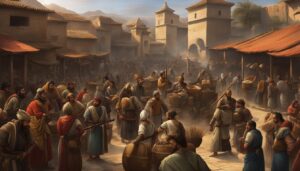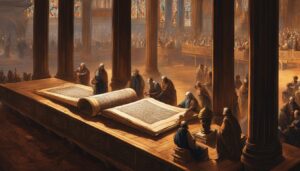
Welcome to this introductory guide on understanding biblical culture and history. In this comprehensive book, written by renowned expert James W. Watts, we will explore the rich tapestry of biblical society, traditions, customs, artifacts, and archaeology. By delving into the origins, composition, and theology of biblical books within their ancient contexts, we aim to provide you with a coherent understanding of the Bible’s past and present function as a scripture.
Throughout this guide, we will examine how Jews and Christians have ritualized the Bible through interpretation, recitations, music, art, and more. By exploring the rhetoric, composition, and theology of various biblical books, with a focus on the Torah and the Gospels, we will shed light on their origins and the rituals they have inspired throughout history.
Furthermore, we will delve into the cultural history and scriptural function of modern bibles, discussing their influence on various aspects of society, including history, science, race, and gender. From relic books to Bible illustrations, we will uncover the role the Bible has played as an iconic and expressive medium throughout the ages.
Key Takeaways:
- Understanding the Bible’s cultural and historical context is essential for interpreting its message.
- Ritualization of the Bible has played a significant role in both Jewish and Christian traditions.
- Exploring the rhetoric and theology of biblical books offers insights into their origins and influence.
- Modern bibles have shaped society and sparked debates on various topics, including authority and biblical law.
- Biblical artifacts and archaeology provide tangible evidence of the ancient biblical culture.
Rhetoric, Composition, and Theology of Biblical Books
Understanding the Bible as a Scripture in History, Culture, and Religion delves into the rhetoric, composition, and theology of biblical books. With a particular focus on the Torah and the Gospels, these central blocks of the Hebrew Bible and the New Testament have been the primary subject of Jewish and Christian ritualization throughout history. By analyzing the persuasive rhetoric and semantic contents of these books, James W. Watts sheds light on their origins and their ritualization in iconic and expressive dimensions.
Wisdom literature, prophets, psalms, and wisdom also play a significant role in the interpretation and expression of biblical texts. The interplay between the scriptures and the readers is explored, as well as the influence of scribes and rabbis in interpreting and identifying with the scriptures. Through a meticulous examination of these aspects, Watts provides readers with a deeper understanding of the rich complexity embedded within biblical books.
The rhetorical strategies employed within the biblical texts reflect the cultural and historical contexts in which they were composed. The composition and structure of these books are not solely for narrative purposes but also serve as powerful tools for conveying theological messages. By studying these elements, scholars and readers gain invaluable insights into the biblical traditions and their transformative impact over time.
As we continue to unravel the mysteries of the Bible, it becomes evident that its importance extends beyond religious devotion. The rhetorical, compositional, and theological aspects of biblical books offer a unique lens through which we can examine the cultural, historical, and religious dimensions of ancient civilizations. Through the careful analysis provided by Watts in this book, a comprehensive understanding of these foundational texts is attained, ultimately enriching our knowledge of biblical culture, history, and the enduring influence of scripture.
| Biblical Book | Rhetoric | Composition | Theology |
|---|---|---|---|
| Torah | Explores persuasive rhetoric and semantic content | Examines structure and narrative techniques | Unveils theological concepts and messages |
| Gospels | Analyzes rhetorical strategies and persuasive techniques | Investigates narrative construction and thematic coherence | Reveals theological significance and salvific themes |
The Bible as a Scripture in History and Culture
In the final section of my book, Understanding the Bible as a Scripture in History, Culture, and Religion, I dive deep into the cultural history and scriptural function of modern bibles. The Bible has had a profound influence on various aspects of society, leaving an indelible mark on history and culture.
Throughout history, the Bible has been published, venerated, and used as an iconic and expressive medium. From relic books to the Decalogue tablets, the Bible has held a significant place in society. Moreover, the Bible’s presence in theater and film has captivated audiences and further contributed to its cultural impact.
However, the Bible has not been without controversy. Questions surrounding its authority, biblical law, and modern debates about Genesis have sparked intense discussions. These debates serve as a testament to the Bible’s enduring relevance and its ability to shape religious beliefs.
Overall, Understanding the Bible as a Scripture in History, Culture, and Religion provides a comprehensive and insightful exploration of the Bible’s role as a scripture in shaping history, culture, and religious beliefs. By examining its cultural history and scriptural function, we gain a deeper understanding of the Bible’s profound impact on society.
FAQ
What is the book “Understanding the Bible as a Scripture in History, Culture, and Religion” about?
The book explores the integration of history, culture, and religious significance within the Bible, providing a comprehensive understanding of its past and present function as a scripture.
Who is the author of the book?
The book is written by James W. Watts, a renowned expert in biblical rhetoric and the ritualization of books.
What aspects of the Bible does the book delve into?
The book explores the origins, composition, and theology of biblical books within their ancient contexts, with a particular focus on the Torah and the Gospels.
How does the book examine the ritualization of the Bible?
The book delves into how Jews and Christians have ritualized the Bible through interpretation, recitations, music, art, and more.
Does the book discuss the cultural history and scriptural function of modern Bibles?
Yes, the final section of the book focuses on the cultural history and scriptural function of modern bibles, discussing their influence on society and their role as an iconic and expressive medium.
What controversies surrounding the Bible does the book tackle?
The book tackles controversies such as the authority of the Bible, biblical law, and modern debates about Genesis.








